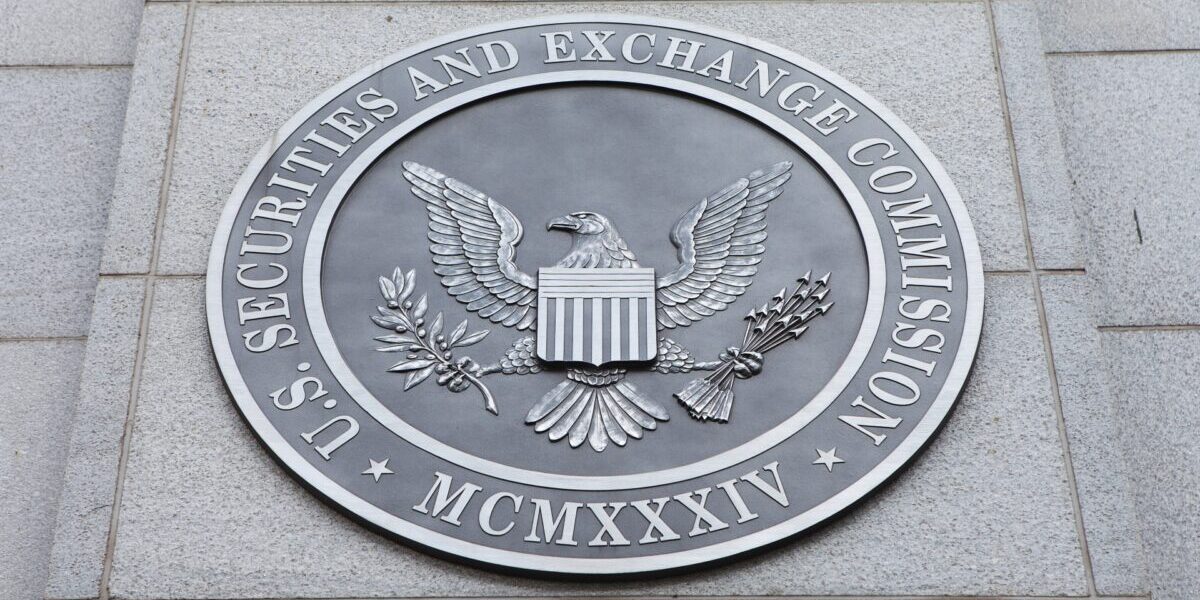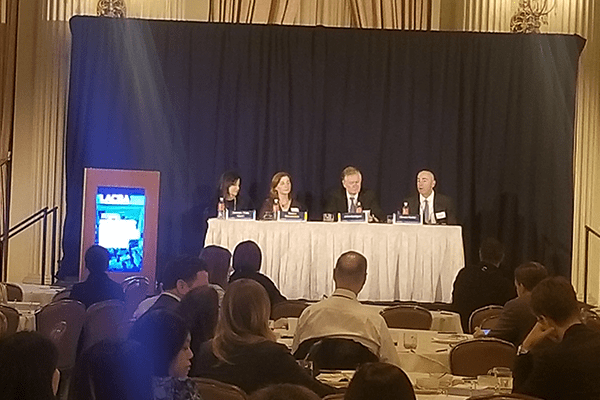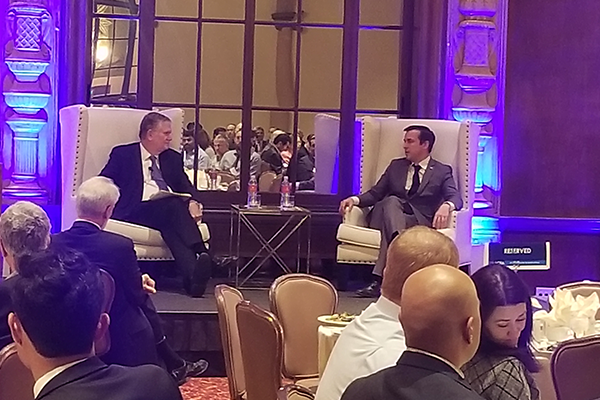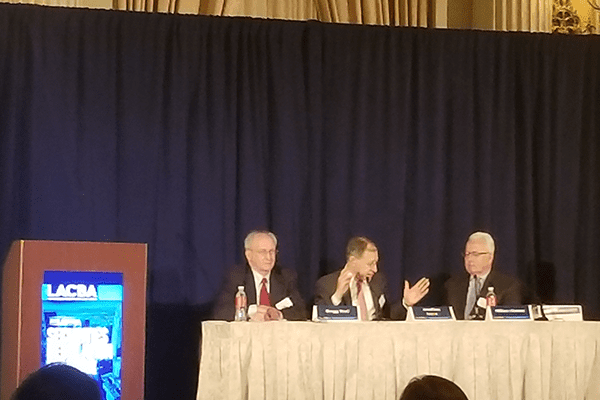Search Posts
Recent Posts
- Do you meet the definition of an “Accredited Investor” under the new SEC Rules? December 8, 2020
- Do You Really Have Time To Read & Understand The Heroes Act? November 23, 2020
- Governor Newsom – Please Order all Court Buildings in the State of California Closed starting March 16 March 15, 2020
- Three Men Arrested in $722 Million Cryptocurrency Fraud Scheme Targeting “Dumb” Investors December 10, 2019
- Should Court Transcripts be Provided to Parties Free of Charge? December 3, 2019
Categories
Subscribe!
Thanks for subscribing! Please check your email for further instructions.

Top Takeaways from LACBA’s 51st Annual Securities Regulation Seminar
The U.S. Securities and Exchange Commission (SEC) looks at the root cause of misconduct and fashions relief that directly addresses the root cause.
– Steven Peikin, SEC, Co-Director, Division of Enforcement
Steven Peikin explained that as a result of the recent SEC Settlement with Tesla, Tesla must establish protocols of oversight with respect to Musks’ tweets. You can read the Tesla complaint in its entirety by clicking here. In that case, a powerful charismatic CEO did not have the requisite oversight by the Board, however, Tesla is a company where investors rely a lot on the CEO.
The SEC’s package of relief will 1) put in place more governance and 2) establish more control of CEO’s communications. Tesla is a bit of a unicorn and people will make arguments which may or may not make traction but bars are not punishment, they are remedial and an investor protection tool. Where you have a threat to market integrity and investor protection, you should not abandon bars. Steven Peikin went on to say that he is proud of the Tesla and Theranos cases brought by the SEC because they are good examples of penalties and remedies.

Michelle Wein Layne, Stephanie Avakian, John F. Hartigan and Steven Peikin
Do Not Blindly Rely on SEC No Action Letters.
– John F. Hartigan, Partner, Morgan Lewis
John F. Hartigan explained that sophisticated practitioners out there cannot advise clients based solely on no action letters because a clients’ circumstances may materially vary from the circumstances of no action letters. It is important to remember that no action letters are case specific and it is not always easy to read the tea leaves.
Cyber related threats are the biggest threat in our market and in many respects, our country.
– Steven Peikin, SEC, Co-Director, Division of Enforcement
The timing of the creation of the Cyber Unit at the SEC was genius because of the explosion of Initial Coin Offerings, or ICOs.

Everyone should read the recently released Report of Investigation pursuant to Section 21(a) of the Exchange Act and October is national cybersecurity awareness month!
– Michele Wein Layne, Regional Director, SEC Los Angeles Regional Office
Michele Wein Layne described the recently released Report of Investigation pursuant to Section 21(a) of the Exchange Act on internal accounting controls (Report). The Report described victims of business email compromise, an example of cyber-related fraud, which caused company losses of millions of dollars where employees received emails from fake executives and fake vendors.
Michele Wein Layne described two types of frauds:
1) Spoofed emails from fake executives which were not especially sophisticated. They used similar but not identical email addresses or company executives and directed company emails to mid-level employees urging them to send immediate emergency funds to a wire address; and
2) Emails from fake vendors which started with a hack into the vendors’ email address. After a successful hack, an email was sent from an actual email address to request payment for invoices that were modified or a change to banking information and then funds were wired.
By the time the Authorities come in, the money is gone and it is highly unlikely that the money will be recovered.
– Ranee Katzenstein, Chief, Major Fraud Unit, U.S. Attorney’s Office, C.D. California
This is the main reason it is imperative to be vigilant prior to making an investment decision.
Authorities expect cooperation from wrongdoers and among Agencies, however, this is not always achievable. Agencies want to ensure that resources are being used well instead of trying to seek penalties from companies that have already been penalized.
– Steven Peikin, SEC, Co-Director, Division of Enforcement
If wrongdoers come forward before the authorities step in, they will be likely be rewarded with less severe punishment. Michele Wein Layne noted that it is very unlikely for someone to come forward to cooperating with respect to insider trading cases, rather, cooperation is usually a result of regulatory action.
Steven Peikin explained that when deciding whether to take enforcement action, the goal when confronting a investigation is to decide if the penalty is appropriate and how to divide it among the agencies. However, this is not achievable in two instances:
1) The ability to coordinate with all agencies is not always there, for example, with respect to state authority or international authority; and
2) Situations in which the defense has made the decision to negotiate separately with each authority. The outcome is not as good when the defense negotiates separately with each authority because it leads to piling on.

If the SEC has opened an investigation against you and you discover a problem while complying with a document request, it is better for you to disclose the problem and indicate that you will do everything to resolve it rather than try to hide it or wait for the SEC to discover it.
–Bryan Bennett, Associate Regional Director – Examinations, SEC Los Angeles Regional Office
Gladys Xiques, Deputy Chief Compliance Officer, Senior Vice President, TCW, provided some tips on how to comply with an SEC document request:
- Organize documents;
- Manage Expectations of insiders, outsiders and regulators;
- Appoint a single individual to serve as a primary liaison with the SEC staff;
- Do not alter records produced to the SEC;
- Look back at deficiency letters that were given to the firm and ensure that all issues have been addressed (and maintain copies of documents); and
- During examination, set up a daily briefing with the regulators.
Blockchain technology has a lot of promise. We want to help people who have good ideas.
–William Hinman, SEC, Division Director of Corporation Finance
William Hinman outlined the fact that IPOS have gained traction and have been increasing since 2016. The decline in IPOs was due to the availability of money in the private sector. The SEC is interested in collaboration, that is, working together with issuers to help them be successful in their IPOs.
Within a month of William Hinman’s arrival at the SEC, the SEC implemented the draft registration process. In addition, a mining release that conforms to international standards will be released soon. Finally, the SEC is exploring how to make the process of quarterly reporting more efficient since markets do not typically respond to quarterly reports.
William Hinman discussed digital assets and how to balance the protection of investors with the advance of technology. The SEC has accomplished the following:
- FinHub: You can check out the FinHub by clicking here; and
- Published the DAO report on the issue of whether crypto assets are securities. Read William Hinman’s speech on When Howey met Gary
William Hinman issued some loose guidance by suggesting the use of venture funds to create a token that won’t have the hallmarks of a security so that it is usable on the network, that way you won’t have to worry about it as a security. In addition, William Hinman said that everyone should read the ENY class of 2017 ICOs report – worth reading but it is not optimistic.
William Hinman highlighted that the SEC is afforded statutory authority to provide exemptions and that there is a lot of value for issuers that call the SEC. The SEC can provide the type of guidance that helps resolve issues.
C&DIs on cross border topics on the SEC website have been refreshed and the site is constantly being updated.
In case you were wondering who can be credited with the awesome Howey Coins ICO pre-sale website, it is the Office of Investor Education.

Gatekeepers should ensure that clients don’t make false statements like those in the complaints of Blockvest LLC and Titanium Blockchain Infrastructure Services.
– Amy Jane Longo, SEC, Regional Trial Counsel, SEC Los Angeles Regional Office
Fraudsters are brazen, especially like those in Blockvest LLC that claimed to be a Blockchain Exchange Commission and even provided a link to the SEC website. Both these cases came out of the SEC’s regional office in Los Angeles. You can read my blog on Titanium blockchain here.
Whether you have a security or utility, it comes down to the Economic Reality. You can boil it down to two questions: “Why are you selling it and why are people buying it?”
–Robert A. Cohen, Chief, SEC Cyber Enforcement Unit
According to Robert Cohen, as a result of the 2010 Division restructuring related to the creation of specialized units, 5 specialized units were created in addition to the Cyber Unit. The Cyber Unit is meant to identify priority areas and small areas with specialized expertise (specialized units in general do not have monopoly over cases, however, they can be used a resource to others in the division including helping with policy issues).
The Cyber Unit divides cases into the following three categories:
- Digital assets, cryptocurrency, ICOs (cryptocurrencies are not a security but digital assets could be a security, a currency, a commodity, etc.)
- Trading cases that have cyber issues (hacking, people that take over brokerage accounts & manipulation).
- Cybersecurity issues with two parts a) regulated entities that have rules from the commission that require cybersecurity offenses; and b) issuer disclosure – the need for public companies to disclose cybersecurity risks and disclosure.

Robert Cohen stressed that the Commission needs to be flexible with resources. Enforcement leads come from Tips, Complaints and Referrals (TCRs), whistleblowers, and are self-generated. At Headquarter and in regional offices, SEC Staff look for things that look wrong. In terms of which cases to open, this is a critically important question:
- Is it fraud?
- Is it ongoing fraud?
- Does it look big or small?
- Do we know who is doing it?
- If so, are they someone who we can get?
- Where are the assets? Can we get to them?
- Are there gatekeeper issues?
Robert Cohen also indicated that big international frauds where money is overseas are not going to be left alone but the SEC must be smart about how to pursue these cases and it comes down to who the SEC is partnering with, i.e., other agencies such as the FBI, etc. There is a ton of internal coordination and FinHub is a great new way to communicate from the SEC out, from the outside into the SEC and a mechanism to communicate internally.
Katherine Blair, Manatt, Phelps & Phillips LLP, explained that “what’s old is new again.” Katherine Blair said that during the .com era all companies were adding .com to their names. Similar to what many companies are doing to get noticed or inflate their valuations. In addition, most of the enforcement actions against ICOs are fraud-related therefore, fraud is fraud. She also noted the way ICOs are trying to skirt the securities laws by calling it a “white paper” instead of an offering memorandum. She mentioned the Munchee ICO, which I have previously blogged about.
The newest SEC Commissioner Robert J. Jackson, Jr., appointed by President Donald Trump is super “high energy” and is eager to crack down on fraud. You can watch a clip of SEC Commissioner Robert J. Jackson, Jr. talking by clicking below!